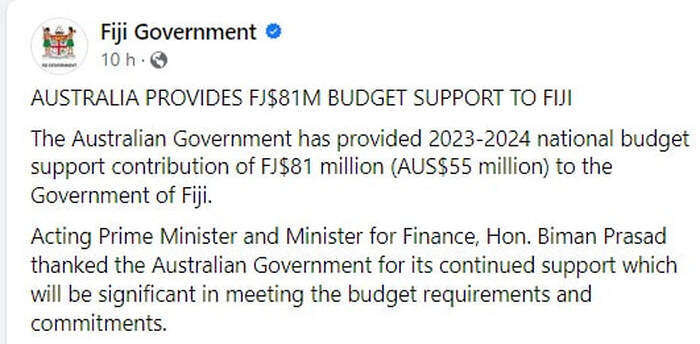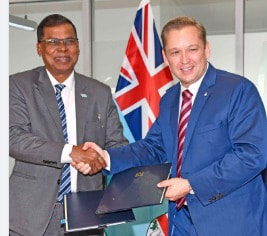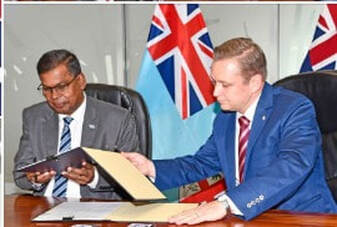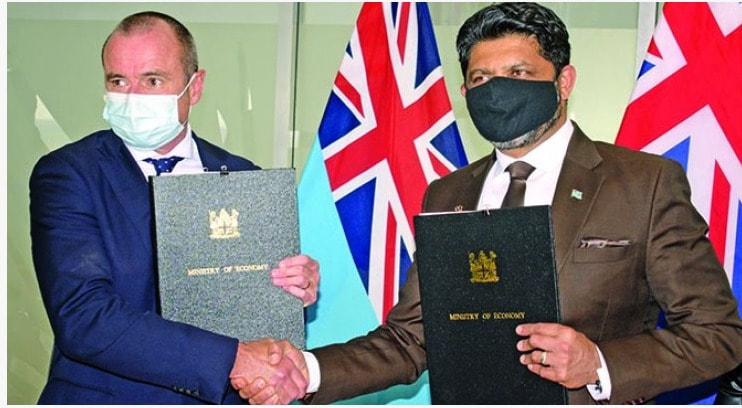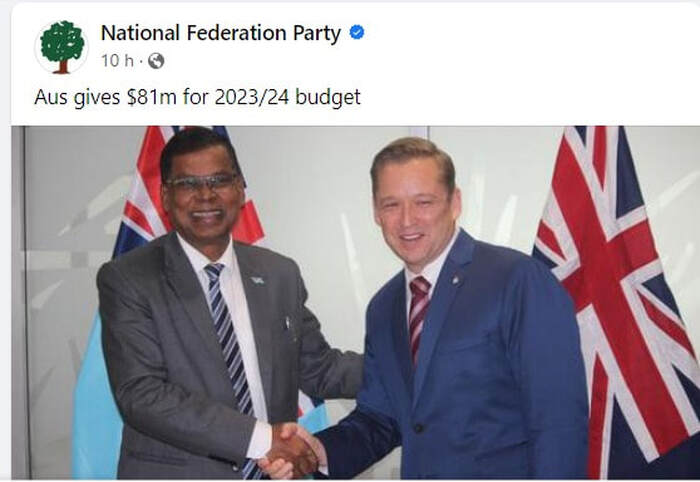"Fiji is drowning in debt. By the middle of next year, when it is expected to reach $9 billion, every Fiji citizen will be carrying $10,000 of it. This is why we have to beg Australia and New Zealand for cash. We no longer have the ability to borrow money sustainably...Unlike Parliament, where he [Aiyaz Khaiyum] seems to be allowed to do anything he wants, this is the real world – the world where boasting does not pay the bills. It was a relief at least to hear him say “thank you”."
Early this week, Australia wrote the Fiji Government a cheque for another $130 million.
That brings to more than $300 million in cash that Australia and New Zealand have had to inject into Fiji this year to keep its Government afloat. Australian government Minister Zed Seselja said at the handover ceremony that Australia’s cash was “helping address Fiji’s immediate fiscal pressures, supporting debt sustainability, and bolstering vital services and social protection plans of Fiji’s most vulnerable people”.
Listening to him intently was Economy Minister Aiyaz Sayed-Khaiyum, with a little less of his usual Parliamentary swagger.
Unlike Parliament, where he seems to be allowed to do anything he wants, this is the real world – the world where boasting does not pay the bills. It was a relief at least to hear him say “thank you”.
Because we owe an immense debt of gratitude to Australia and New Zealand. Without their cheque books we would have unpaid public servants, desperate welfare recipients and completely collapsed government services. Of course the Economy Minister could not quite put the boasting aside.
Australia and New Zealand, he said, had faith and trust in the FijiFirst government’s ability to “manage the State’s finances prudently and in an accountable and transparent manner”.
The reality of the matter, as the minister likes to say, is that no one reading the latest Auditor-General’s reports could not have any confidence in the accountability and transparency of the Fiji Government’s finances.
The politicians and diplomats of Australia and New Zealand have learned to grit their teeth and keep their eyes looking firmly forward when they hear statements like this. They have to keep their vital interests in mind.
Their vital interests are to ensure that Fiji does not fall further into the clutches of China’s aggressive diplomacy. And they do not want a humanitarian crisis on their back doors. But if, as we expect, we are in government next year, we will have to deal with a major mess in Government finances. We are quite fearful of what we will find. And there is a direct link between the state of Fiji’s democracy and the state of its government finances.
A government that is not democratic and accountable to the people becomes lazy, inefficient and corrupt.
It spends money the way it likes and not the way it should. And as it becomes more insecure about its grip on power, it spends for politics, not for people.
That is what is happening to Fiji.
How has Fiji come to this?
Fiji is drowning in debt. By the middle of next year, when it is expected to reach $9 billion, every Fiji citizen will be carrying $10,000 of it. This is why we have to beg Australia and New Zealand for cash. We no longer have the ability to borrow money sustainably.
The Government is broke. Why? Because our Government is not interested in governance. It is only interested in spending money to win elections and keep itself in power. I used to say that the one thing the Fiji- First government could do well was spend money.
I have changed my mind. I don’t think they can even do that well. For all of its talk about transparency and accountability, the Government does not wish to be either transparent or accountable. The Government talks big in every budget about how much it will spend – hundreds of millions on roads, on health, on education.
I have never understood why it talks like this. The important thing is not how much money you spend. It is how you spend it.
How is it that after spending hundreds of millions on roads they are still such a mess? How is that after spending hundreds of millions on education our whole education system is a disaster? And let’s not even talk about the health system where the Government has just given up. Certain information cannot be hidden from the people.
This includes how much the Government budgets to spend and how much it has to borrow. The Government has to tell Parliament about that. But what we do not know about is how much money is lost through wastage, mismanagement and even corruption. We believe that a hard re-look at the Government’s finances could save hundreds of millions of dollars a year.
The Auditor-General does his best. But he has limited resources. He cannot check on everything. And his office is constantly pressured and bullied by the Government. A few years ago he was forced to publicly apologise for a so-called “mistake” about Government companies that made the Economy Minister look bad.
Certainly from what I could see, the Auditor- General had not made a mistake.
But an important lesson was learned about how to be the Auditor-General under the Fiji First Government – the one mistake you must never make is to upset the Economy Minister!
We all know what has happened to the Public Accounts Committee (PAC) of Parliament. The rules, ever since independence, have been that an Opposition MP is its chair. That is because the chair sets the agenda and determines who speaks and asks questions.
At first, under the 2013 Constitution, the Fiji First Government followed those rules. I was the original chair of the PAC in 2014 when Parliament began again. But after I started asking too many questions, the Government changed Parliament’s rules. It decided that a Government MP should be the chair instead. Aiyaz Sayed-Khaiyum said this had to be done because I was being “political”.
This is another favourite line of his. Anything the Government does is “government”. But anything the Opposition does is “political”.
I see from last week’s Attorney-General’s conference that even some of his lawyer friends have picked up the habit!
Less cash, same culture
So for most of us – even the Members of Parliament, to whom the Government is supposed to be accountable – Government finances are a mystery.
We do not know – and we will not know, until we get into Government – the sort of mess we are going to have to clean up. But what is clearly in sight is the culture of how this Government spends money. It spends it on itself, for the benefit of its members and to make itself look good.
Two days ago the director of one of Fiji’s most respected non-governmental organisations, FRIEND, spoke up again about how families in dire poverty are – again – going without food. We all know how FRIEND and other organisations in the Alliance for COVID-19 Humanitarian Response stepped in to help the families devastated by the initial Covid outbreak. The Government refused to work with them, listen to their views or respect the networks of knowledge they had built up.
They instead embarked on their usual disastrous and inefficient cash and food handouts. As usual, they spent a lot of money and put a lot of pictures on Facebook – but stories were rife about how food went to the wrong places and how many people in need missed out.
Now that tourism is starting up again, the Government’s eyes are focused only on that. They have forgotten that in the past two years thousands of people have been left behind and their jobs and livelihoods have not sprung back. And, of course, as soon as the borders opened, the Prime Minister took off to COP26.
Now he is in Dubai. The Government has never opened up about how its ministers collect daily subsistence allowances of thousands of dollars, even while they say that $360 is enough to last a COVID-affected Fiji citizen for three months. This is a Government that pays itself lavish salaries and allowances, travels around in motorcades and pours money into QORVIS-funded propaganda.
Their shameless use of the Government Facebook page to boost their failing political fortunes is only one more example of this.
The new reality of near-bankruptcy has not changed the Government’s attitude. For this Government it is still all about them – and the priority is not to do good, but to look good. This is the culture the next government will have to change. It must fi rst focus on the small but important things that drive the culture of transparency and accountability.
The NFP will:
i) slash ministers’ salaries and allowances
(II) and bring back a Parliamentary Emoluments Committee, made up of outsiders, to set these to a fair and realistic level.
(III) We will cut out the motorcades,
(IV) the money spent on propaganda and photo opportunities
(V) and the Government resources consumed on image-making.
We have to get back to the main focus – serving the people. In the end, it does not matter how hard the public servants work to save money or to raise it.
If the politicians will not focus on what is important, nothing will change.
PROF BIMAN PRASAD is leader of the National Federation Party. The views expressed in this article are not necessarily those of The Fiji Times
That brings to more than $300 million in cash that Australia and New Zealand have had to inject into Fiji this year to keep its Government afloat. Australian government Minister Zed Seselja said at the handover ceremony that Australia’s cash was “helping address Fiji’s immediate fiscal pressures, supporting debt sustainability, and bolstering vital services and social protection plans of Fiji’s most vulnerable people”.
Listening to him intently was Economy Minister Aiyaz Sayed-Khaiyum, with a little less of his usual Parliamentary swagger.
Unlike Parliament, where he seems to be allowed to do anything he wants, this is the real world – the world where boasting does not pay the bills. It was a relief at least to hear him say “thank you”.
Because we owe an immense debt of gratitude to Australia and New Zealand. Without their cheque books we would have unpaid public servants, desperate welfare recipients and completely collapsed government services. Of course the Economy Minister could not quite put the boasting aside.
Australia and New Zealand, he said, had faith and trust in the FijiFirst government’s ability to “manage the State’s finances prudently and in an accountable and transparent manner”.
The reality of the matter, as the minister likes to say, is that no one reading the latest Auditor-General’s reports could not have any confidence in the accountability and transparency of the Fiji Government’s finances.
The politicians and diplomats of Australia and New Zealand have learned to grit their teeth and keep their eyes looking firmly forward when they hear statements like this. They have to keep their vital interests in mind.
Their vital interests are to ensure that Fiji does not fall further into the clutches of China’s aggressive diplomacy. And they do not want a humanitarian crisis on their back doors. But if, as we expect, we are in government next year, we will have to deal with a major mess in Government finances. We are quite fearful of what we will find. And there is a direct link between the state of Fiji’s democracy and the state of its government finances.
A government that is not democratic and accountable to the people becomes lazy, inefficient and corrupt.
It spends money the way it likes and not the way it should. And as it becomes more insecure about its grip on power, it spends for politics, not for people.
That is what is happening to Fiji.
How has Fiji come to this?
Fiji is drowning in debt. By the middle of next year, when it is expected to reach $9 billion, every Fiji citizen will be carrying $10,000 of it. This is why we have to beg Australia and New Zealand for cash. We no longer have the ability to borrow money sustainably.
The Government is broke. Why? Because our Government is not interested in governance. It is only interested in spending money to win elections and keep itself in power. I used to say that the one thing the Fiji- First government could do well was spend money.
I have changed my mind. I don’t think they can even do that well. For all of its talk about transparency and accountability, the Government does not wish to be either transparent or accountable. The Government talks big in every budget about how much it will spend – hundreds of millions on roads, on health, on education.
I have never understood why it talks like this. The important thing is not how much money you spend. It is how you spend it.
How is it that after spending hundreds of millions on roads they are still such a mess? How is that after spending hundreds of millions on education our whole education system is a disaster? And let’s not even talk about the health system where the Government has just given up. Certain information cannot be hidden from the people.
This includes how much the Government budgets to spend and how much it has to borrow. The Government has to tell Parliament about that. But what we do not know about is how much money is lost through wastage, mismanagement and even corruption. We believe that a hard re-look at the Government’s finances could save hundreds of millions of dollars a year.
The Auditor-General does his best. But he has limited resources. He cannot check on everything. And his office is constantly pressured and bullied by the Government. A few years ago he was forced to publicly apologise for a so-called “mistake” about Government companies that made the Economy Minister look bad.
Certainly from what I could see, the Auditor- General had not made a mistake.
But an important lesson was learned about how to be the Auditor-General under the Fiji First Government – the one mistake you must never make is to upset the Economy Minister!
We all know what has happened to the Public Accounts Committee (PAC) of Parliament. The rules, ever since independence, have been that an Opposition MP is its chair. That is because the chair sets the agenda and determines who speaks and asks questions.
At first, under the 2013 Constitution, the Fiji First Government followed those rules. I was the original chair of the PAC in 2014 when Parliament began again. But after I started asking too many questions, the Government changed Parliament’s rules. It decided that a Government MP should be the chair instead. Aiyaz Sayed-Khaiyum said this had to be done because I was being “political”.
This is another favourite line of his. Anything the Government does is “government”. But anything the Opposition does is “political”.
I see from last week’s Attorney-General’s conference that even some of his lawyer friends have picked up the habit!
Less cash, same culture
So for most of us – even the Members of Parliament, to whom the Government is supposed to be accountable – Government finances are a mystery.
We do not know – and we will not know, until we get into Government – the sort of mess we are going to have to clean up. But what is clearly in sight is the culture of how this Government spends money. It spends it on itself, for the benefit of its members and to make itself look good.
Two days ago the director of one of Fiji’s most respected non-governmental organisations, FRIEND, spoke up again about how families in dire poverty are – again – going without food. We all know how FRIEND and other organisations in the Alliance for COVID-19 Humanitarian Response stepped in to help the families devastated by the initial Covid outbreak. The Government refused to work with them, listen to their views or respect the networks of knowledge they had built up.
They instead embarked on their usual disastrous and inefficient cash and food handouts. As usual, they spent a lot of money and put a lot of pictures on Facebook – but stories were rife about how food went to the wrong places and how many people in need missed out.
Now that tourism is starting up again, the Government’s eyes are focused only on that. They have forgotten that in the past two years thousands of people have been left behind and their jobs and livelihoods have not sprung back. And, of course, as soon as the borders opened, the Prime Minister took off to COP26.
Now he is in Dubai. The Government has never opened up about how its ministers collect daily subsistence allowances of thousands of dollars, even while they say that $360 is enough to last a COVID-affected Fiji citizen for three months. This is a Government that pays itself lavish salaries and allowances, travels around in motorcades and pours money into QORVIS-funded propaganda.
Their shameless use of the Government Facebook page to boost their failing political fortunes is only one more example of this.
The new reality of near-bankruptcy has not changed the Government’s attitude. For this Government it is still all about them – and the priority is not to do good, but to look good. This is the culture the next government will have to change. It must fi rst focus on the small but important things that drive the culture of transparency and accountability.
The NFP will:
i) slash ministers’ salaries and allowances
(II) and bring back a Parliamentary Emoluments Committee, made up of outsiders, to set these to a fair and realistic level.
(III) We will cut out the motorcades,
(IV) the money spent on propaganda and photo opportunities
(V) and the Government resources consumed on image-making.
We have to get back to the main focus – serving the people. In the end, it does not matter how hard the public servants work to save money or to raise it.
If the politicians will not focus on what is important, nothing will change.
PROF BIMAN PRASAD is leader of the National Federation Party. The views expressed in this article are not necessarily those of The Fiji Times
